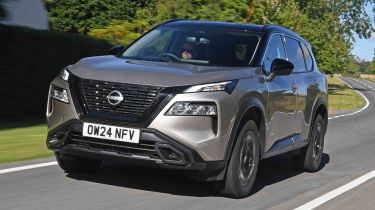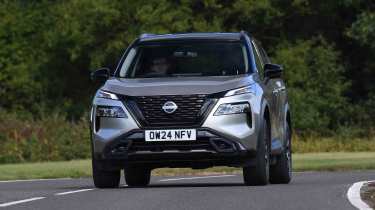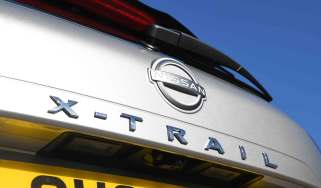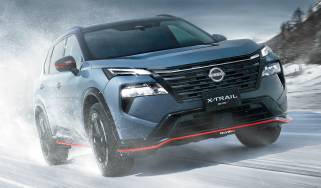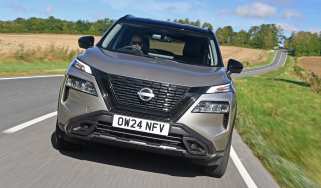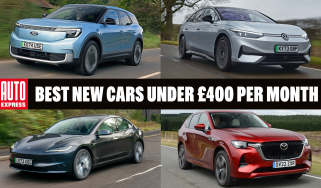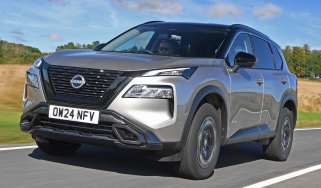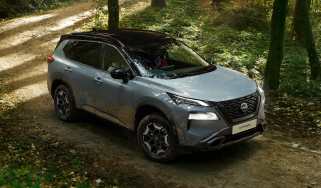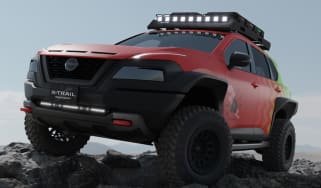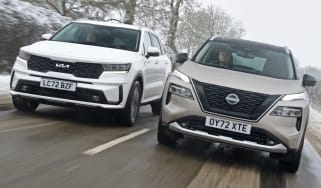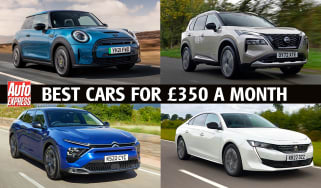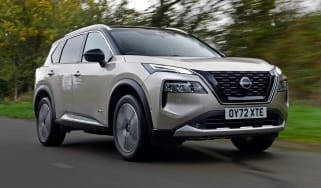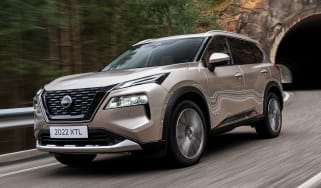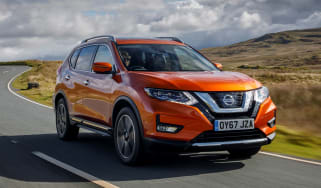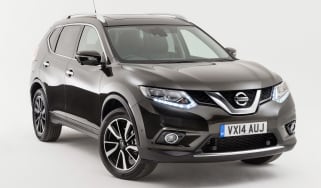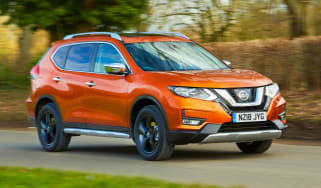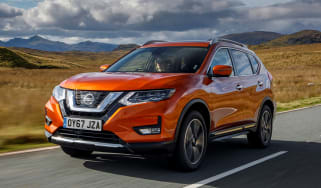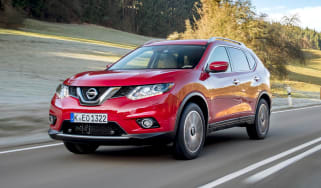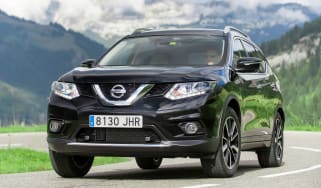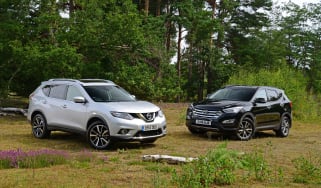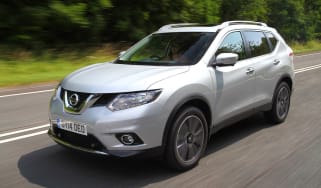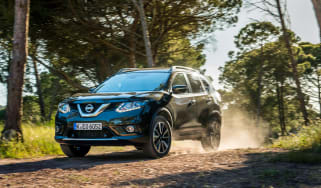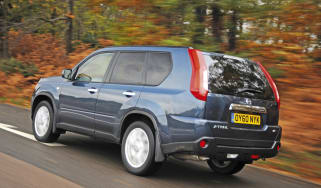Nissan X-Trail review
The Nissan X-Trail is bigger and better than before, but its innovative electrified powertrain isn’t as efficient as some rivals

Our opinion on the Nissan X-Trail
Family car buyers will be pleased to know there have been some big improvements to the Nissan X-Trail SUV, delivering more passenger space, better cabin quality and a more extensive list of standard safety features. It’s still as practical as ever, comfortable, and just as easy to use for long trips as it is for everyday commutes.
It is a bigger car than before, which may deter some, and higher prices at the top end of the range spoil the X-Trail’s ability to challenge its close rivals. However, the real sticking point for both private buyers and business users is that the efficiency of Nissan’s e-Power setup is not as good as it should be. When you examine the numbers, it doesn’t stack up well enough against more conventional competition.
| Key specs | |
| Fuel type | Petrol, hybrid |
| Body style | Mid-size SUV |
| Powertrain |
1.5-litre, 3cyl, turbocharged, mild-hybrid petrol, front-wheel drive 1.5-litre, 3cyl, petrol plus 1x e-motor, front-wheel drive 1.5-litre, 3cyl, petrol plus 1x e-motor, four-wheel drive |
| Safety | 5-star (Euro NCAP, 2021) |
| Warranty | 3-year/60,000-mile |
About the Nissan X-Trail
It’s taken four generations and over twenty years for the Nissan X-Trail to evolve from a rather boxy, workaday SUV into a more polished offering that competes in a very crowded large family SUV market. In that time, its price has crept up, with the entry-level Acenta Premium coming in at just over £36,000. Our preferred N-Connecta trim is just under £39,000, while Tekna starts at over £42,000. Outdoorsy types may be lured towards the slightly more rugged-looking N-Trek variant, which sits above the £43,500 mark. At the top of the X-Trail line-up, meanwhile, sits the poshest Tekna+, and this starts from just under £44,000.
Used - available now

2024 Nissan
X-Trail
22,242 milesAutomaticPetrol1.5L
Cash £22,741
2019 Nissan
X-Trail
24,306 milesAutomaticDiesel1.8L
Cash £17,018
2024 Nissan
X-Trail
21,755 milesAutomaticPetrol1.5L
Cash £29,034
2024 Nissan
X-Trail
14,706 milesAutomaticPetrol1.5L
Cash £24,995The latest X-Trail is wider and taller than the model it replaces, while its sharper styling gives the large SUV a more aggressive look, which Nissan hopes will attract customers away from a host of well-established rivals.
With electrification increasingly becoming the norm, Nissan has chosen not to go with a typical full-hybrid or even a plug-in hybrid set-up for the X-Trail, instead opting for a type of range-extending hybrid that it calls e-Power. The system utilises a 1.5-litre petrol engine that helps charge a battery, which in turn powers an electric motor that drives the wheels. X-Trail buyers can choose from either a 201bhp front-wheel drive single motor version, or a 210bhp all-wheel drive dual motor configuration.
A 161bhp mild-hybrid, front-wheel drive model is also available as the entry point to the range, while all cars feature Nissan’s Xtronic CVT automatic transmission.
Trim levels include Acenta Premium, N-Connecta, Tekna, N-Trek, and Tekna+, and all trims come backed with creature comforts. Entry-level Acenta Premium includes a rear-view camera, dual-zone air conditioning, Apple CarPlay and Android Auto connectivity, while our preferred N-Connecta trim includes a 12.3-inch infotainment screen with sat-nav to complement the standard digital instrument cluster, which displays key information for the driver such as sat-nav directions, active safety systems and audio controls.
If you're interest in buying Nissan X-Trail of your own, we're here to help. Configure your ideal Nissan X-Trail now to get great deals from our network of dealerships, check out the best X-Trail leasing deals or take a look at our top used X-Trail models through our Find A Car service. You can get a great price for your current car with Auto Express Sell My Car.
Performance & driving experience
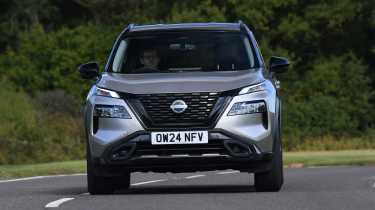
|
Pros |
|
| Cons |
|
All fourth-generation Nissan X-Trail models use a 1.5-litre, three-cylinder engine, with mild-hybrid versions available alongside the more powerful e-Power models. The latter system utilises the car’s engine as a generator to charge an onboard lithium-ion battery, which in turn powers the electric motor that's used to drive the wheels.
It’s an unusual set-up, but we found it to be a smooth operator with no jerky transition between electric and combustion-engined power sources, as you might find with some rival full-hybrid or plug-in hybrid powertrains.
The e-4ORCE all-wheel drive model has a dual electric motor setup that is able to respond 10,000 times faster than a mechanical four-wheel drive system – according to Nissan. This should be useful to those who need the traction benefits of four-wheel drive to get about in the winter, or have to tow a trailer or caravan out of a field.
Electric motors, 0-60mph acceleration and top speed
The Nissan X-Trail is not a car bought for its handling prowess on twisty B-roads or its straight-line performance. Nevertheless, the Japanese SUV is capable of a decent turn of speed, with the quickest 210bhp e-4ORCE, all-wheel drive (five-seat) model able to cover 0-62mph in 7.0 seconds flat. Opting for seven seats means you’ll need a further two tenths of a second to reach the sprint benchmark.
If you’re not fussed about having 4WD capability or seven seats, then the X-Trail 201bhp e-Power version is the one to go for. The mid-range car manages 0-62mph in 8.0 seconds, while the 161bhp mild-hybrid variant is the slowest option taking 9.6 seconds to reach 62mph.
Town driving, visibility and parking
The novel hybrid-cum-range-extender system really does provide an EV driving experience, making it an incredibly easy car to drive smoothly at low speeds.
The X-Trail is perfectly comfortable out on the road, with the suspension only really troubled by the worst of the UK’s pockmarked routes. When the engine is idling to charge the battery, we did find it can sound droney, but the rest of the time, it isn’t that intrusive. The same goes for the high-pitched whine produced by the X-Trail's electric motors, which we found to be far more audible at low speeds than in the Kia Sorento we recently pitted against the Nissan, but quietens down at higher speeds.
Buyers will find the ‘e-Pedal Step’ mode particularly useful in urban traffic, because it allows for one-pedal driving, enabling you to control the vehicle for the majority of the time from just the accelerator pedal. It’s also helpful to improve efficiency at low speeds and maximise regeneration of the hybrid battery.
B-road driving and handling
If you’re happy not hustling along in too much of a hurry, then you'll find the X-Trail a good companion. We found the steering to be devoid of any feedback, and there was quite a bit of body roll through twisty roads, but for most people’s needs, it fulfils its brief competently.
Motorway driving and long-distance comfort
This large SUV is a decent cruiser at motorway speeds, with little wind or engine noise entering the cabin and spoiling the sense of refinement. However, the e-Power’s electric motors do create quite a persistent noise.
| Model | Power | 0-60mph | Top speed |
| 1.5 MHEV 163 | 161bhp | 9.6s | 124mph |
| 1.5 e-Power 204 | 201bhp | 8.0s | 105mph |
| 1.5 e-Power e-4ORCE 213 | 210bhp | 7.2s | 111mph |
“The X-Trail’s basic controls are well calibrated. The brakes are easy to modulate, and it can turn tighter than the Kia Sportage, so it feels surprisingly wieldy for a seven-seater.” - Alex Ingram, chief reviewer, who pitted the X-Trail against a Kia Sportage as part of an Auto Express real-world twin test.
Range, charging & running costs
|
Pros |
|
| Cons |
|
The 201bhp e-Power, front-wheel drive model offers the best fuel economy in the X-Trail range; up to 49.6mpg on the WLTP combined cycle, with CO2 emissions from 129g/km. Upgrade to the e-4ORCE four-wheel drive model and Nissan claims you should see fuel economy of around 45mpg with CO2 levels from 141g/km.
When we tested the 4WD version of the X-Trail against a Kia Sorento Hybrid, the Nissan managed to return 42.5mpg compared to the Kia's average of 39.5mpg. The X-Trail’s eagerness to work in EV mode meant that it was the more efficient around town of the two, and overall, it’s impressively frugal at low speeds.
If you spend less time driving in town, fuel economy from this set-up drops, as we only managed to achieve an average of around 36mpg when we first drove the X-Trail in the UK. Buyers who regularly undertake longer journeys may wish to look towards the Skoda Kodiaq, because it is still being offered with diesel power, which provides greater fuel economy on long motorway trips.
The entry-level 161bhp mild-hybrid version is cheaper to buy, but the five-seater only manages to average 40.9mpg, while specifying an extra two seats causes the fuel economy figure to fall to 39.8mpg. CO2 emissions start from 157g/km.
| Model | MPG | CO2 | Insurance group |
| 1.5 MHEV 163 | 39.8mpg | 157g/km | 22E |
| 1.5 e-Power 204 | 49.6mpg | 129g/km | 24E |
| 1.5 e-Power e-4ORCE 213 | 45.6mpg | 141g/km | 28E |
Insurance groups
Insurance premiums shouldn’t be too expensive if you opt for the 161bhp mild-hybrid model in group 22, while opting for the top Tekna+ trim means you’ll only see an increase to group 25. The 201bhp e-Power versions occupy groups 22 to 25, with the 210bhp e-4ORCE variants in groups 29 to 31. Opting for seven seats can also result in a slight increase in the insurance group ranking.
Tax
Nissan’s e-Power technology doesn’t deliver the same overall efficiency as a plug-in hybrid set-up, which means you probably won’t see many business users opting for an X-Trail as their next company car. The e-Power version offers better Benefit-in-Kind (BiK) company car tax rates than the mild-hybrid petrol, but they won’t be anywhere near as low as those of an electric SUV, such as the Kia EV9.
Private buyers will also need to be choosy about which version of X-Trail they go for, because some higher trim versions breach the £40,000 barrier, meaning you’ll need to pay a supplemental tax above the standard rate from the second time the vehicle is taxed until it is six years old.
Depreciation
Buyers will be pleased to hear that the X-Trail retains between 41 and 48 per cent of its original value after a typical ownership period of three years and 36,000 miles. In comparison, the X-Trail falls short of the Peugeot 5008, which retains 50 to 54 per cent. The Skoda Kodiaq also fares better than the Nissan at 53 to 59 per cent over the same period.
To get an accurate valuation on a specific model check out our free car valuation tool...
Interior, design & technology
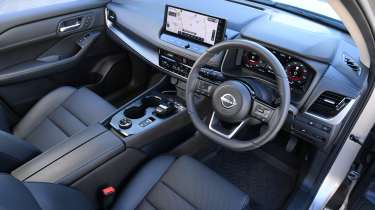
|
Pros |
|
| Cons |
|
With an increase in overall width and height, the fourth-generation Nissan X-Trail has a more imposing look than before. It has a genuine SUV feel compared with its smaller Nissan Qashqai sibling, and its sharper lines project a more aggressive stance.
There is a choice of ten body colours to choose from and, while the X-Trail suits a grey or silver hue, the Sunset Orange paintwork works well – particularly if you specify an optional two-tone black roof. If you don’t need seven seats, then a five-seat X-Trail costs £1,000 less than the equivalent seven-seater model.
If you want your X-Trail to have more of a premium air, then you’ll have to pay extra for either the Tekna, Tekna+, or N-Trek versions. Moving up to these top trim levels brings a power-operated tailgate with a hands-free function, quilted leather upholstery, a head-up display and a Bose audio system with ten speakers. The X-Trail’s standard 18-inch diamond cut alloys are fine, but the bigger, 20-inch versions that come with Tekna+ cars give the SUV a little more presence.
Interior and dashboard design
Inside, the X-Trail has more in common with the Qashqai than Nissan’s more futuristic-looking Nissan Ariya EV, which means it does feel a little dated in the cabin.
Simple ergonomics take priority over flamboyant style in the X-Trail's cabin. We found the rather stubby gear selector easy to use, and we like that it doesn’t take up much space on the centre console, while the climate controls are all chunky physical buttons and dials, not touch-sensitive sliders or plastic panels.
Materials and build quality
Quality is mostly good, and everything feels fairly well screwed together, however, so it's definitely a step up over the previous model, with plenty of squidgy plastics and well-damped buttons.
Infotainment, sat-nav and stereo
With the demise of the Visia trim available with earlier versions, every X-Trail comes with some form of touchscreen infotainment system. In Acenta Premium specification, there’s an eight-inch touchscreen, plus wireless Apple CarPlay, wired Android Auto, and a six-speaker audio system. If you go for N-Connecta trim and above, you're rewarded with a 12.3-inch infotainment touchscreen (like the one fitted to the car pictured), while top-of-the-range models add a 10.8-inch head-up display.
Nissan has made some big steps with its infotainment systems in recent years, and while it’s not class-leading in any one area, the X-Trail's infotainment set-up is fairly solid across the board, although we found it a bit sluggish at times during testing. The menus are cleanly laid out, with a home display that shows three main widgets, and the navigation system is the largest of the trio.
There are a couple of physical shortcuts along the bottom of the screen, which make skipping tracks or radio stations easy on the move. The optional Bose sound system may be worth the extra £590 if you enjoy listening to music.
“The 12.3-inch screen looks fine, but the lack of responsiveness when entering a navigation address, for example, means you have to check each letter has been received in turn, which is painstaking, as is having to go through the steering wheel controls to work the dashboard display.” - Paul Barker, editor, who drove the X-Trail N-Trek in the UK.
Boot space & practicality
|
Pros |
|
| Cons |
|
Buyers will be impressed by the Nissan X-Trail’s refinement on the road. It’s a comfortable and relaxing place in which to travel, while Nissan hasn’t forgotten the practical touches that make family life a little easier. Items such as a centre armrest with two cup holders, luggage hooks and lighting in the boot, 60/40 split-folding rear seats and two rear ISOFIX points all add to the X-Trail’s ease of use.
Moving up through the various trim levels brings more luxury kit, such as a heating function for the front and rear seats, steering wheel and windscreen, plus wireless smartphone charging, tri-zone air-conditioning, and quilted leather upholstery. It's also worth noting that the X-Trail is offered in both five- and seven-seater configurations.
| Dimensions | |
| Length | 4,680mm |
| Width | 1,840mm 2,065mm (inc mirrors) |
| Height | 1,725mm |
| Number of seats | 5 (optional 7) |
| Boot space | 585-1,424-litres (5 seats), 575-1,396 (e-Power, 5 seats), 485-1,298-litres (7 seats) |
Dimensions and size
At 4,760mm long, the X-Trail is slightly longer than a Skoda Kodiaq and a Peugeot 5008. The fourth-generation model is 20mm wider and 15mm taller than its predecessor, which gives it an even more substantial look on the road.
Driving position, seats & space in the front
Room up front is good and what you’d expect from a large SUV, and the X-Trail certainly feels more spacious than its smaller sibling, the Nissan Qashqai
During our testing, we also found that the driving position in the X-Trail isn’t quite as commanding as the Kia Sorento’s. The C-pillars are relatively thick, and the rear side windows are small, so visibility is a little compromised, and you’ll be utilising the standard reversing camera to compensate for this.
We found that the smartphone charging shelf is big enough for even the largest of smartphones. The glovebox isn’t particularly roomy, however, the door bins are a decent size. The latter lack any kind of carpeted inserts that could stop items from rattling around while you're driving.
Seats & space in the back
Rear passengers benefit from lots of legroom and headroom. We also like how the centre seat in the X-Trail's middle bench folds down entirely to provide a huge armrest for rear passengers.
If you decide to order your X-Trail with seven seats, only shorter people will feel comfortable in the back row. The first issue is that while the rear doors open nice and wide (almost to 90 degrees, which is useful when fitting a bulky child seat), the middle-row seats don’t move very far out of the way, so you need to wriggle through a small gap to access the third row. That third row is a little too small for adults due to limited knee and headroom, plus the seats are quite firm. They’re fine for occasional use, but it isn’t a full-time seven-seater like the more spacious Kia Sorento, which comes as standard with seven seats.
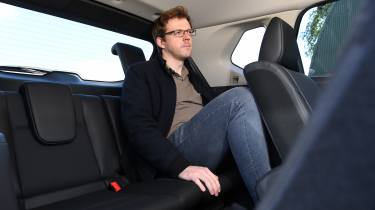
Boot space
The X-Trail’s boot isn’t the largest in its class. In the mild-hybrid model, you get 585 litres of luggage space (with rear seats in an upright position), which is 81 litres more than you’ll find in the Nissan Qashqai. The e-Power versions offer 575 litres of cargo space, while a seven-seat model reduces this to 485 litres overall. Folding the rear seats unlocks a more spacious load area of around 1,300 to 1,400 litres, depending on whether you opt for the five- or seven-seat X-Trail.
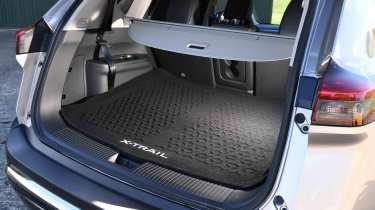
Towing
If you’re prioritising towing ability, then you’ll want to avoid the front-wheel drive 201bhp e-Power version because it only has a 670kg maximum braked trailer weight. The 161bhp mild-hybrid model has a 2,000kg limit in five-seat guise, which is reduced to 1,800kg if you opt for a seven-seater variant. The top-of-the-range 210bhp e-Power e-4ORCE four-wheel drive is capable of pulling up to 1,800kg, although its overall capacity is reduced to 1,650kg when configured as a seven-seat model.
“Not that an adult will thank you if you do make them sit back there, but it’s a minor gymnastic challenge to clamber through and, depending on how big or generous your middle row passengers are in sliding their seats forward, there’s not much space in the back.” - Paul Barker, editor, who tested the X-Trail N-Trek on UK roads.
Reliability & safety
|
Pros |
|
| Cons |
|
If you’re a buyer looking for a safe family car, then the Nissan X-Trail is worth considering. Industry safety body, Euro NCAP, awarded the large SUV its full five-star rating, with excellent scores of 91 per cent for adult occupants and 90 per cent for child passenger protection. The X-Trail’s high level of standard safety equipment was also recognised with a 95 per cent rating.
The X-Trail includes a raft of active safety systems that help to make journeys easier and less stressful. Using a camera mounted in the windscreen and a radar behind the Nissan badge in the front grille, the onboard technology includes autonomous emergency braking, a forward collision warning, a lane-keep assist system, a blind-spot warning and traffic sign recognition.
Intelligent cruise control is also available and is capable of controlling acceleration and deceleration to automatically maintain a suitable following distance to the vehicle in front. Tekna and Tekna+ cars also include Nissan’s ProPilot driver assistance set-up.
The X-Trail is yet to appear in our Driver Power owner satisfaction survey. The Nissan brand received a fairly middling result in our best manufacturer rankings, though, ranking 15th place out 32 other brands in our most recent results.
| Key standard safety features |
|
| Euro NCAP safety ratings |
|
Buying and owning
Our best buy: Nissan X-Trail e-Power e-4orce Tekna
While it’s not the most efficient hybrid SUV on the market, we still recommend opting for the e-4orce powertrain because it’ll keep running costs under control while providing a decent bit of power when you need it.
Tekna trim adds to the price, but this added investment does make the X-Trail feel like a more premium offering, thanks to touches such as 19-inch alloy wheels, a panoramic roof, a power tailgate, and Nissan’s ProPilot tech.
Nissan X-Trail alternatives
Seven-seater competition for the X-Trail comes in the form of the capable Peugeot 5008, Kia Sorento, Skoda Kodiaq, and Hyundai Santa Fe. Those who regularly need to use the third row will be better off with any of those rivals since they all offer space for adults, whereas the X-Trail can be a bit of a squeeze. For those with smaller children in car seats, the Sorento and Santa Fe provide four ISOFIX points, compared with just two for the X-Trail.
Company car drivers or those who wish to cut out their emissions may instead be tempted by the Kia EV9. Electric seven-seaters are still something of a rarity, so this model does come with a sizable £65,000 starting price. There’s also the Volvo EX90 which is much more luxurious, but this comes at a cost of at least £82,000.
Latest deals on the X-Trail and rivals
Nissan X-Trail pictures
New & used Nissan X-Trail deals
Frequently Asked Questions
The Nissan X-Trail is a large, practical SUV that's available with seven seats, feels well built and is comfortable to drive, however it's not the most efficient hybrid car we've ever tested.
